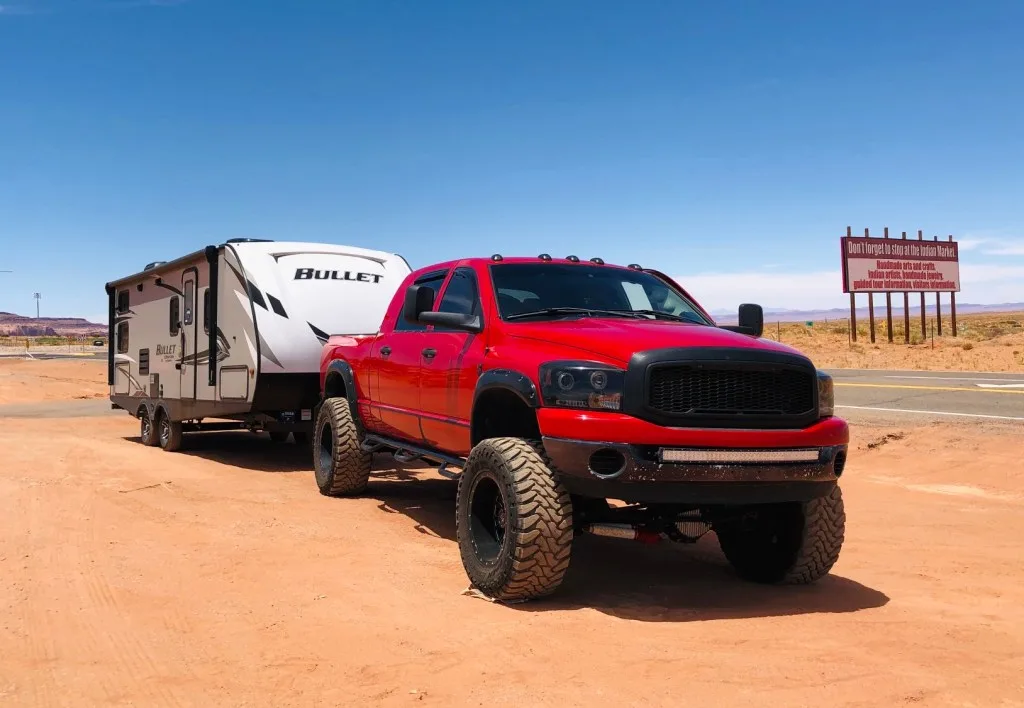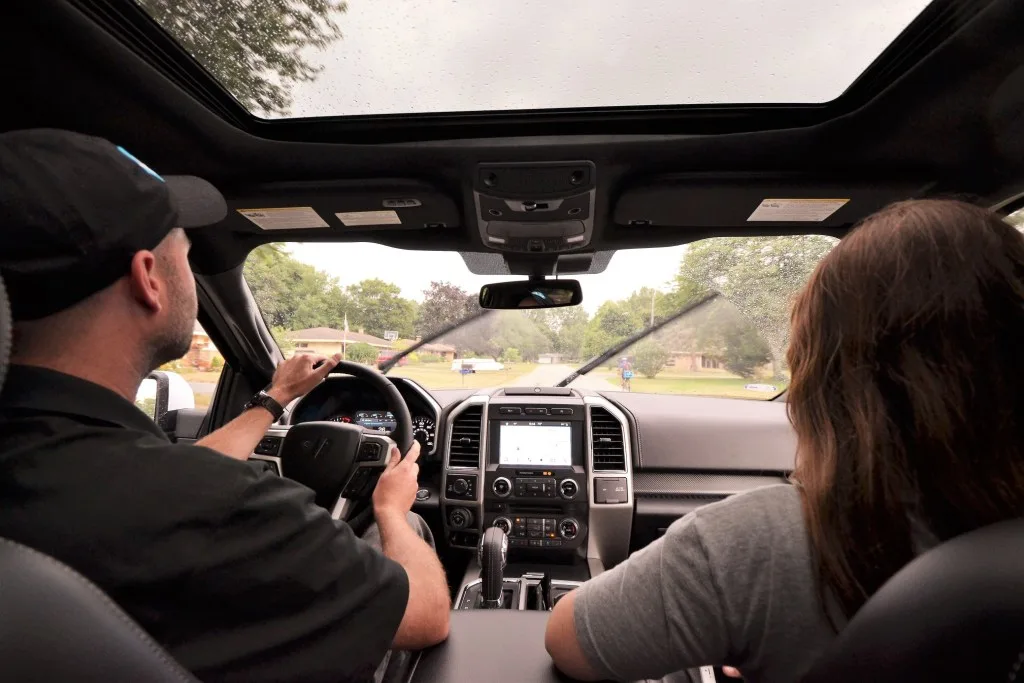When buying a truck, everyone’s needs and purposes are different. Have you looked into the GVWR, GCWR, and GAWR of different trucks?
Or, if you already have a truck, do you know those numbers? If you’re wondering what in the world these acronyms mean, you’re not alone. But it’s critically important to learn about them if you’re doing any kind of towing.
Let’s look at each one, and maybe then you’ll have a better idea of what kind of truck you need. Let’s dive in!
What Does GVWR Mean for Towing?
The GVWR or Gross Vehicle Weight Rating is the maximum weight for safe travel. The manufacturer establishes this number. It’s the maximum amount of weight your truck can safely hold with all cargo, passengers, and fluids. This has nothing to do with towing capacity. It is strictly the weight of the vehicle itself fully loaded.
When towing, the trailer also has a GVWR. Your truck must be able to tow the GVWR of the trailer safely. Remember, this is the fully loaded version of the trailer and not the trailer empty. We’ll talk more about towing capacity below.
How Do You Calculate Your GVWR?
Manufacturers test each truck individually. They put the GVWR information on a sticker and place it inside the truck’s door or in the owner’s manual.
The manufacturer will weigh the empty truck and then add the weight of the cargo. This includes passengers, fuel, accessories, etc. You don’t want to put too much weight inside the truck or in the bed and exceed the GVWR.

What Happens If You Exceed Your GVWR?
Exceeding the GVWR is always risky. When you put too much weight on the truck axles and exceed the GVWR of the truck itself, you’re straining the engine, transmission, and brake system.
This can result in severe damage to your vehicle and can also void any warranties or insurance claims should an accident occur. The truck wasn’t built to carry more than the GVWR. So you’re shortening the life of the truck by exceeding the GVWR.
Is GVWR the Same as Towing Capacity?
The GVWR of a truck is not the same as the towing capacity. In fact, the numbers aren’t related. The GVWR strictly refers to the maximum weight inside the truck and in the truck’s bed. If you were to weigh the fully loaded truck on a scale, it must be below the GVWR.
Towing capacity refers to the amount of weight the truck can safely pull. However, staying under this number is just as important. Having an overloaded truck (or exceeding the GVWR) can damage the truck just like towing too much weight (or exceeding the towing capacity) can.
Putting too much stress on the engine, transmission, and brake system can shorten the vehicle’s life. It’s also dangerous to travel over these limits.
Pro Tip: Unsure what your towing capacity is? This is How to Find Towing Capacity by VIN.
What’s the Difference Between GVWR and GCWR?
The GCWR or Gross Combined Weight Rating takes into consideration both the truck and the trailer. This gives you the maximum amount of combined weight you can tow safely. For example, if your truck is 6,000 lbs and the GCWR is 14,000 lbs, then you can’t safely tow a trailer weighing more than 8,000 lbs.
You want your truck to be within the GVWR and your truck and trailer to be within the GCWR.
This is also different from the towing capacity.
Your truck may be able to tow 10,000 lbs. But if you’ve weighed down the bed of the truck with tools, equipment, and other items, it reduces the amount of weight you can tow because you can’t exceed the GCWR.

Other Important Towing Terms
All of these acronyms can be confusing, but they’re very important to understand to travel safely down the road. GVWR, GCWR, and towing capacity are all critical numbers. But there are a few more terms you want to know when towing.
GTW
The GTW or Gross Trailer Weight is the weight of the trailer and everything in it. This number doesn’t come from the manufacturer. It’s the actual weight. You can only find out your GTW by visiting a scale. CAT scales are available at many truck stops.
You simply pull onto the scale with the trailer fully loaded. Disconnect your truck and drive it completely off of the scale. Then you’ll receive a ticket that gives you your GTW. You’ll want to make sure this number is below the GVWR of the trailer and below the towing capacity of the truck.
GAWR
The GAWR or Gross Axle Weight Rating is the weight each axle can safely carry. The rear axle and front axle of the truck have different GAWR. This number is usually printed inside the door and will say GAWR FR and GAWR RR.
This number becomes particularly important when loading heavy items into the truck’s bed. You don’t want to exceed the weight that the rear axle can safely withstand.
Payload
Payload is the amount of weight in the truck. This is not the same as towing capacity. Towing capacity refers to the amount of weight a truck can safely pull behind it. Payload capacity is the amount of weight a truck can safely hold.
This includes anything in the bed of the truck. When towing fifth wheels, the payload capacity becomes a critical number because of the weight of the front cap and fifth wheel hitch in the truck’s bed. Payload is also important for truck owners like construction workers who haul heavy loads in the truck’s bed.
Pro Tip: Before you tow, make sure you can check off everything on The RV Trailer Towing Checklist.

Tongue Weight
Tongue weight is how much weight your trailer tongue can hold. Usually, this number is around 10-20% of the trailer’s total weight. For example, an empty 2,000-lb trailer probably has a tongue weight of about 200-400 lbs.
This means your truck’s tongue has to be able to withstand that amount of force. But when you add cargo into the trailer, the tongue weight will increase. So you always want to make sure your truck can safely withstand the force placed on its back end.
Dry Weight
Dry weight refers to the weight of the vehicle empty. The weight of fuel, fluids, passengers, cargo, toolboxes, or bed covers isn’t included.
This is just the weight of the vehicle itself and comes from the manufacturer. The dry weight is slightly different from the curb weight.
Curb Weight
Curb weight is the weight of the truck in operating condition. It includes all of the standard accessories needed to run the vehicle and all of the fluids.
This means curb weight is the weight of the truck with a full tank of gas, engine oil, brake fluid, coolant, etc. There’s still no cargo or passengers included.
GVWR: Know Before You Tow!
It’s easy to get confused with all of these terms. But to travel safely, you want to be familiar with each of them. Know the limits of your vehicle.
You’re not only endangering the lives of you and your passengers, but you’re also endangering the lives of other drivers when you don’t follow the manufacturer’s guidelines. You could end up spending a lot of money on repairs, too. Plus, the truck won’t operate as smoothly.
Don’t trust chats or information from other truck owners because each truck is unique. Even the same model could have different measurements. Do your own research, read the owner’s manual, look at the stickers.
Do you know the GVWR of your truck? Drop a comment below!
Discover the Best Free Camping Across the USA
To be honest with you, we hate paying for camping. There are so many free campsites in America (with complete privacy).
You should give it a try!
As a matter of fact, these free campsites are yours. Every time you pay federal taxes, you’re contributing to these lands.
Become a FREE CAMPING INSIDER and join the 100,000 campers that love to score the best site!
We’ll send you the 50 Best Free Campsites in the USA (one per state). Access the list by submitting your email below:
2017 Ford F-350 diesel dually GVWR 14,000 lbs